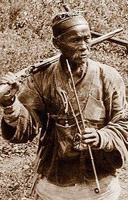

|
Korean Job Discussion Forums
"The Internet's Meeting Place for ESL/EFL Teachers from Around the World!"
|
| View previous topic :: View next topic |
| Author |
Message |
Jammer113
Joined: 13 Oct 2008
|
 Posted: Fri Jan 30, 2009 6:59 pm Post subject: History of the Korean Language Posted: Fri Jan 30, 2009 6:59 pm Post subject: History of the Korean Language |
 |
|
| I'm looking for a good book on the history of the Korean language. I have a linguistics background, and I'm interested in language history. If anyone can show me links to good books, esp. on Korean book websites, I would appreciate it. |
|
| Back to top |
|
 |
VanIslander

Joined: 18 Aug 2003
Location: Geoje, Hadong, Tongyeong,... now in a small coastal island town outside Gyeongsangnamdo!
|
 Posted: Sat Jan 31, 2009 12:31 pm Post subject: Posted: Sat Jan 31, 2009 12:31 pm Post subject: |
 |
|
i love how Korean, Hungarian, Finnish and Turkish share a few distinctive grammatical similarities
and how three of those same four countries lead the world in suicides and traffic fatalities
and how the Koreans came from the west, the Hungarians and Finns from the east and the Turks from the north
and how a group of people just east of the Urals speak a dying language which also shares the same linguistic similarities
... it all paints a picture, a rough and ready jigsaw puzzle where the edges don't fit perfectly but the approximate placement is pretty clear, at least as a historical sketch/theory |
|
| Back to top |
|
 |
michaelambling
Joined: 31 Dec 2008
Location: Paradise
|
 Posted: Sat Jan 31, 2009 3:17 pm Post subject: Posted: Sat Jan 31, 2009 3:17 pm Post subject: |
 |
|
| VanIslander wrote: |
| i love how Korean, Hungarian, Finnish and Turkish share a few distinctive grammatical similarities |
 |
|
| Back to top |
|
 |
Guri Guy

Joined: 07 Sep 2003
Location: Bamboo Island
|
 Posted: Sat Jan 31, 2009 3:46 pm Post subject: Posted: Sat Jan 31, 2009 3:46 pm Post subject: |
 |
|
| Why the confused face? They are all Ural-Altaic languages. I have often wondered about the high suicide rate in these countries. Curious... |
|
| Back to top |
|
 |
Jammer113
Joined: 13 Oct 2008
|
 Posted: Sat Jan 31, 2009 3:57 pm Post subject: Posted: Sat Jan 31, 2009 3:57 pm Post subject: |
 |
|
I'm less interested in where Korean originally came from and more interested in things such as vocabulary, grammatical, and sound changes over the last 1500 years. I'm interested in a rather detailed discussion on the system of writing which existed before the use of Chinese characters, and where it was used. I'm interested in different speaking/writing styles between men and women, upper and lower class, and different geographical areas in Korea. I'm very interested in knowing exactly what resources are available to scholars for examining these issues.
I'm also interested in a more detailed discussion on the theories of the Korean language's origin, but it's rather secondary.
Thanks for any help! |
|
| Back to top |
|
 |
bluelake

Joined: 01 Dec 2005
|
 Posted: Sat Jan 31, 2009 4:37 pm Post subject: Posted: Sat Jan 31, 2009 4:37 pm Post subject: |
 |
|
Interesting subject. From some things I've read, the modern Korean language evolved from the language spoken in the Silla dynasty. As Silla was the victor in the war between the Three Kingdoms (Silla, Baekje, Goguryeo) in the 7th century, the latter two languages eventually faded away.
Another aspect that is personally interesting to me is the relationship between Ural-Altaic languages and those societies that used the horn bow (archery): Korea, Mongolia, Turkey, Hungary, Finland (Sami), China, India, Persia. |
|
| Back to top |
|
 |
Blockhead confidence
Joined: 02 Apr 2008
|
 Posted: Sat Jan 31, 2009 6:07 pm Post subject: Posted: Sat Jan 31, 2009 6:07 pm Post subject: |
 |
|
Jared Diamond has an article claiming that Japanese is a Korean language (coming from the Goguryeo kingdom, I think he means), but goes on to say that they have less in common with each other than Russian and English.
By coincidence, I met a Russian guy once who was fluent in Japanese, Korean, English and French, too, I think, and he claimed Japanese and Korean were more similar than French and English.
Anyone have an opinion on this? |
|
| Back to top |
|
 |
exit86
Joined: 17 May 2006
|
 Posted: Sat Jan 31, 2009 6:09 pm Post subject: Posted: Sat Jan 31, 2009 6:09 pm Post subject: |
 |
|
I've been conducting a similar search for such materials.
It is pretty sparse in Korean; in English, almost non-existant.
Most of the Korean linguistic scholars I know have focused their energies almost solely on English; therefore, when I pose such questions about the Korean language, I seldom get answers of substance.
Paradoxically, I recommend looking to Western scholars and institution
presses for such information. You also may try dropping by the Royal Asiatic Society office downtown; they have a really good selection of obscure books on Korea which you won't find in the bookstores--a lot
of out-of-print books and scholarly journals.
Keep us posted if anyone comes across something good. |
|
| Back to top |
|
 |
bluelake

Joined: 01 Dec 2005
|
 Posted: Sat Jan 31, 2009 6:23 pm Post subject: Posted: Sat Jan 31, 2009 6:23 pm Post subject: |
 |
|
| Blockhead confidence wrote: |
Jared Diamond has an article claiming that Japanese is a Korean language (coming from the Goguryeo kingdom, I think he means), but goes on to say that they have less in common with each other than Russian and English.
By coincidence, I met a Russian guy once who was fluent in Japanese, Korean, English and French, too, I think, and he claimed Japanese and Korean were more similar than French and English.
Anyone have an opinion on this? |
From the article you quoted:
| Quote: |
That is, the modern Ainu language of Hokkaido is not a model for the ancient Jomon language of Kyushu. By the same token, modern Korean may be a poor model for the ancient Yayoi language of Korean immigrants in 400 B.C. In the centuries before Korea became unified politically in A.D. 676, it consisted of three kingdoms. Modern Korean is derived from the language of the kingdom of Silla, the kingdom that emerged triumphant and unified Korea, but Silla was not the kingdom that had close contact with Japan in the preceding centuries. Early Korean chronicles tell us that the different kingdoms had different languages. While the languages of the kingdoms defeated by Silla are poorly known, the few preserved words of one of those kingdoms, Koguryo, are much more similar to the corresponding Old Japanese words than are the corresponding modern Korean words. Korean languages may have been even more diverse in 400 B.C., before political unification had reached the stage of three kingdoms. The Korean language that reached Japan in 400 B.C., and that evolved into modern Japanese, I suspect, was quite different from the Silla language that evolved into modern Korean. Hence we should not be surprised that modern Japanese and Korean people resemble each other far more in their appearance and genes than in their languages.
|
It mentioned what I knew about the Silla language evolving into modern Korean language. I had heard the Koguryo/Goguryeo-Japanese linguistic connection before; from what I remember, there were some stone inscriptions from K/G and linguists (using some type of rosetta--I forget what) were able to figure out how some words were pronounced and they supposedly sounded somewhat like Japanese. I'm not a linguist, so I never really looked into it very deeply; maybe someone else has? |
|
| Back to top |
|
 |
VanIslander

Joined: 18 Aug 2003
Location: Geoje, Hadong, Tongyeong,... now in a small coastal island town outside Gyeongsangnamdo!
|
 Posted: Wed Feb 04, 2009 6:51 am Post subject: Posted: Wed Feb 04, 2009 6:51 am Post subject: |
 |
|
| bluelake wrote: |
| ... interesting to me is the relationship between Ural-Altaic languages and those societies that used the horn bow (archery): Korea... Turkey, Hungary, Finland (Sami)... |
that adds to the picture!
I know the Hungarians and Koreans were quick to adopt spicy food unlike their modern neighbours, dunno about the Finns or Turks in that regard.
And Hungarian is the only European language I know of which puts the family name first, before given names. Also, the word for father is also 'apa'. It startled me when I first came because my father was Hungarian and I immediately noted such similarities.
There's even a joint Hungarian-Korean linguistic professor exchange program to study the similarities.
I personally have noted that the Finns, Hungarians and Koreans are especially TENACIOUS or STUBBORN as a cultural trait, not just the personality quirk of occasional individuals.
So much of what has happened in the past doesn't survive as 'history'. The stories that have been lost! |
|
| Back to top |
|
 |
NoExplode

Joined: 15 Oct 2008
|
 Posted: Wed Feb 04, 2009 9:17 am Post subject: Posted: Wed Feb 04, 2009 9:17 am Post subject: |
 |
|
| VanIslander wrote: |
| bluelake wrote: |
| ... interesting to me is the relationship between Ural-Altaic languages and those societies that used the horn bow (archery): Korea... Turkey, Hungary, Finland (Sami)... |
that adds to the picture!
I know the Hungarians and Koreans were quick to adopt spicy food unlike their modern neighbours, dunno about the Finns or Turks in that regard.
And Hungarian is the only European language I know of which puts the family name first, before given names. Also, the word for father is also 'apa'. It startled me when I first came because my father was Hungarian and I immediately noted such similarities.
There's even a joint Hungarian-Korean linguistic professor exchange program to study the similarities.
I personally have noted that the Finns, Hungarians and Koreans are especially TENACIOUS or STUBBORN as a cultural trait, not just the personality quirk of occasional individuals.
So much of what has happened in the past doesn't survive as 'history'. The stories that have been lost! |
I have a Hungarian friend who works at Samsung, and he swears that Korean and Hungarian sound almost identical--from a distance. He described it that if it's far away enough where you can't understand the words, but can hear sounds, they are really similar in tone and the "lilt" --or intonation.
But he's never asked me if paprika is too spicy for me. Maybe they are what Koreans would have been without the isolation and the wierdness that that breeds. |
|
| Back to top |
|
 |
|
|
You cannot post new topics in this forum
You cannot reply to topics in this forum
You cannot edit your posts in this forum
You cannot delete your posts in this forum
You cannot vote in polls in this forum
|
|

